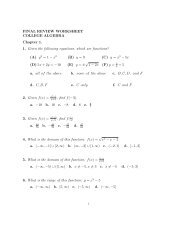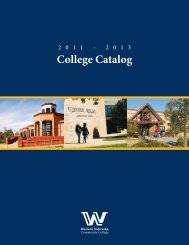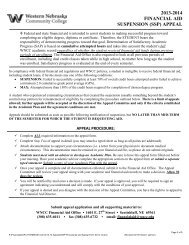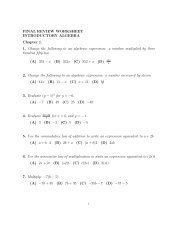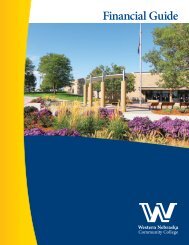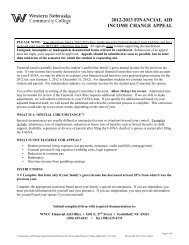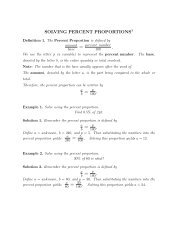WNCC 2010 Self-Study Report - Western Nebraska Community ...
WNCC 2010 Self-Study Report - Western Nebraska Community ...
WNCC 2010 Self-Study Report - Western Nebraska Community ...
You also want an ePaper? Increase the reach of your titles
YUMPU automatically turns print PDFs into web optimized ePapers that Google loves.
5. Personal Development–including maintaining mental and physical wellness, and<br />
developing leadership and teamwork abilities and lifelong learning skills (RR 67)<br />
General Education Assessment<br />
As part of a comprehensive assessment program, <strong>WNCC</strong> assesses learning at the course,<br />
program, general education (GE), and institutional levels, as well as within the areas of student<br />
services and non-credit offerings, as discussed below:<br />
1. Individual course analysis:<br />
Teachers of individual general education courses analyze to what extent their course<br />
addresses the established general education goals. Obviously, no course will lend itself to<br />
all of the goals; however, all general education courses devote themselves to at least one<br />
"knowledge" and one "skills" goal. Such an assessment addresses the following queries:<br />
a. Does the course contain elements that address at least one GE competency<br />
(Communication, Critical Thinking and Problem Solving, Computer and<br />
Information Literacy, Cultural and Civic Awareness, Personal Development)?<br />
b. Are these elements presented as a primary or secondary emphasis?<br />
c. Does the course improve essential skills (reading, writing, computer literacy)?<br />
d. How does the general education course fit into the overall program plan?<br />
2. Program-level measures:<br />
In 2000, a General Education Matrix was developed asking instructors to identify which of<br />
the general education skills were present in their courses. The results were interesting<br />
and informative, but there existed no way to measure those outcomes and to collect the<br />
results in a database for comparative purposes.<br />
In order to verify the effectiveness of the general-education core, and because general<br />
education courses are the common thread linking assorted certificates, diplomas, and<br />
degrees awards, <strong>WNCC</strong> has elected to assess the various aspects of the stated general<br />
education goals through the controlled application of designated rubrics, which were<br />
distributed to faculty members and are also available on the Assessment website as well<br />
as on the eLumen system. Instructors who teach a course listed as general-educational<br />
offerings, or who teach a course which features instruction tied to one or more of the<br />
particular aspects of one of the general education goals, rate student work with one of the<br />
standardized rubrics to determine student performance.<br />
After the determination of the student achievement, results are entered into eLumen by the<br />
instructor. Faculty members and administrative personnel in the instructional line can<br />
determine from these results how well individual traits, as well as the general-education<br />
core as a whole, are being mastered by students. While the results are stored in<br />
aggregate on eLumen, individual instructors can compare the results from their students to<br />
the larger pool to determine strong showings in order to capitalize on whatever strategies<br />
seem to lead to high performance. In the alternative, instructors can uncover instances<br />
where a change in curriculum or instructional delivery may be indicated by learning<br />
Page 100<br />
<strong>Western</strong> <strong>Nebraska</strong> <strong>Community</strong> College



